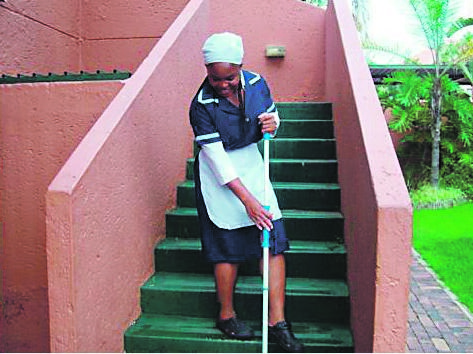
Domestic workers do critical work but the continued failure to include them in the act to claim for injuries sustained at work is unconstitutional, write Kelebogile Khunou and Thulani Nkosi.
In an imminent court case, the Pretoria High Court will hear the matter of Mahlangu v Minister of Labour, in which the surviving daughter of a domestic worker, who died at her employers home, will be challenging the constitutionality of the Compensation for Occupational Injuries and Diseases Act (Coida).
The act excludes domestic workers from its definition of "employee" and precludes them from claiming from the Compensation Fund for work-related injuries, illnesses or death.
On March 31 2012, Maria Mahlangu, a domestic worker who was partially blind, was allegedly washing the outside of some windows when she slipped from the stepladder on which she was standing and fell into the adjacent pool, which was unfenced and uncovered. Maria could not swim and drowned. Her body was discovered hours later by her employer, who had been present in the home at the time of the incident.
When the employer was asked to compensate the family, he replied that he could only afford to give them R2 500. If Maria had been employed in any place other than as a domestic worker, her dependants would have been eligible for compensation for her death, which occurred at work. Instead, her daughter and grandson, for whom she was the sole breadwinner, were left destitute.
Employers pay into the Compensation Fund each month for each employee. In the event of injuries, diseases or death arising out of and in the course of employment, statutory benefits are paid from the fund to employees or dependants of deceased employees.
The act, however, expressly excludes domestic workers, defining an “employee” as “a person who has entered into or works under a contract of service or of apprenticeship or learnership, with an employer … but does not include … a domestic employee employed as such in a private household”.
READ: Compensation Fund goes private
The effect of this exclusion is that domestic workers, 75% of whom, according to the National Income Dynamics Survey of 2012, are the sole income providers for their families, cannot claim from the fund, as their employers are absolved from contributing to it. This leaves them and their families vulnerable and without a safety net against loss of income due to workplace injury, illness or death.
Domestic work is not viewed by the public as having occupational hazards. Instead, hundreds of domestic workers, which includes gardeners, drivers and caregivers, according to the Department of Labour’s definition, experience work-related injuries and illnesses or, like Maria Mahlangu, have died. In a study commissioned by Solidarity Center to investigate the incidences of workplace injury among domestic workers in South Africa, interview respondents reported injuries, ailments and diseases such as dog bites, blindness, deafness, arthritis, back injuries, chronic spinal cord injuries, broken limbs, cuts, tuberculosis, asthma and bone fractures. Incidences of physical violence from employers have also been reported. While all other employees have a fail-safe against injuries and diseases sustained in the workplace, domestic workers are left out in the cold.
The implication of excluding domestic workers is that the only recourse for them and their dependants is to sue employers. It is unreasonable to expect that they or their families could take up such litigation.
They are isolated from one another, separated across individual homes, making it difficult for them to organise and campaign for better working conditions. That their place of work is in the private home, behind closed doors, only intensifies their vulnerability, and exposes them to possible exploitation and abuse.
According to a report by the University of the Western Cape’s Social Law Project, the Compensation Fund’s justification for domestic workers’ exclusion has mainly been that it would be “logistically impossible to administer” because there is the potential for a single domestic worker to have multiple employers. This argument, however, does not hold up since, as the Social Law Project has argued, the Unemployment Insurance Act, which includes domestic workers, is administered in a similar way to Coida and the issue of multiple employers has been resolved.
Labour Minister Mildred Oliphant has confirmed – at a conference for decent work in 2011, in her 2013 budget vote in Parliament and at a domestic workers imbizo in Soweto in 2014 – that the department intends to amend the act to include domestic workers.
Taking these promises into account, in addition to the constitutionality of section 1 of Coida, a core component of Mahlangu’s daughter’s argument in the forthcoming case will be that the failure by the department to amend the act timeously is in itself an unconstitutional act worthy of censure by the court.
Fair working conditions for domestic workers require legal reform but, more importantly, they require the transformation of attitudes and behaviours formed over decades of exploitation and degradation. The inclusion of domestic workers in the act would not solve the problem of the unfair, discriminatory and abusive treatment of domestic workers, but it would be a step in the right direction.
Khunou is a researcher and Nkosi is a senior attorney at the Socio-Economic Rights Institute




 Publications
Publications
 Partners
Partners








